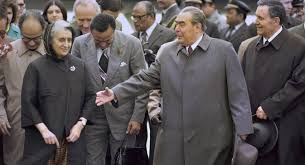Vasili Mitrokhin had come out with his volume called ‘Mitrokhin Archive’. H
He was a former KGB spy who later defected to the United Kingdom.
In his chapter 'The Special Relationship With India’ (Part 1: The Supremacy of the Indian National Congress), Mitrokhin reveals that -- "The Third World country on which the KGB eventually concentrated post operational effort during the Cold War was India".
Among other things, the former spy claimed that Nehru did not realise "how thoroughly the Indian embassy in Moscow was being penetrated by the KGB". It also says that by the sixties, the KGB penetration of the Indian intelligence community and other parts of official bureaucracy had enabled it to turn the tables on the Intelligence Branch (the Indian IB)".
The archive claims Nehru's close associate and advisor Krishna Menon too was cultivated.
On Indira Gandhi, the former spy writes that KGB's "first prolonged contact" with Indira Gandhi had taken place when Indira Gandhi visited Moscow in 1953 after Stalin's death. The Russians put her encircled by 'male admirers' and Indira was "overwhelmed" by the attention "lavished on her".
"The Films Division of India’s Ministry of Information and Broadcasting made a 20-minute documentary film on the 1976 state visit of Indira Gandhi to the Soviet Union. Any young person who watches the film would understand what the old timers are talking about when they talk about how strong ties were at one time," says 'Russia Beyond'.
The report also states:
"The political and economic relationship reached its peak in the late-1970s when the Soviet Union became India’s largest trading partner and defence supplier, with some critics claiming that Agra shoes and Indian soaps were traded for tanks and guns.
Mrs Gandhi made the right decision to ally with the Soviets in the early-1970s.
The friendship treaty that was signed by the two countries all but guaranteed that India could liberate Bangladesh from a genocidal West Pakistani regime, without being attacked by a Anglo-American force that cared little about the murder of 3 million civilians."
Meanwhile on Krishna Menon being influenced by the KGP, the Mitrokhin papers say --
"... with communist support he was elected as an Independent in West Bengal. Some of the issues on which he campaigned suggest that he had been influenced by KGB active measures ... as for example, in his demand that American troops in Vietnam be tried for genocide".
On the Communist Party of India (CPI), the book says: "In the mid 1970s Soviet funds for the CPI was passed by operation officers of the New Delhi main residency to a senior member of the party's national council code named BANKIR at a number of different locations".
After becoming Prime Minister, Nehru paid a diplomatic visit to the USSR, where each incident was ‘carefully staged’. According to Mitrokhin, the Soviets were eyeing India as a ‘playground’ for CIA and KGB agents. After Indira Gandhi (given the codename ‘Vano’ by Mitrokhin) became Prime Minister, the KGB managed to infiltrate deeper into the Indian government.
Like Nehru, Indira Gandhi too was made to believe that the Communist revolution of Russia was a ‘beaming light’ for the world, and often praised the ‘revolutionary’ principles followed in Soviet factories which were carefully staged during her visits.
The concerns arise when Mitrokhin claims that 7 cabinet ministers from the Congress party were elected due to Soviet funding during the regime of Indira Gandhi, while the defense minister during Nehru’s tenure (V. Krishna Menon) was also given Soviet backing. Mitrokhin Archives claim that due to Soviet backing and influence, former defense minister V. Krishna Menon purchased Soviet MiGs instead of British lightnings after his election campaign got funded by KGB in 1962 and 1967. (as reported in a section of media)
Mitrokhin also claimed that by 1973, the KGB had 10 Indian newspapers on its payroll as well as a press agency under its control.
In 1972, the KGB reportedly planted 3789 articles in Indian newspapers - probably more than any other country in the non-communist world.
ends







No comments:
Post a Comment